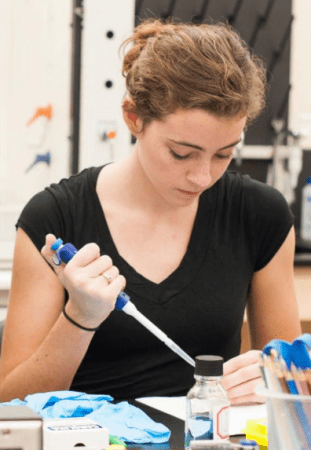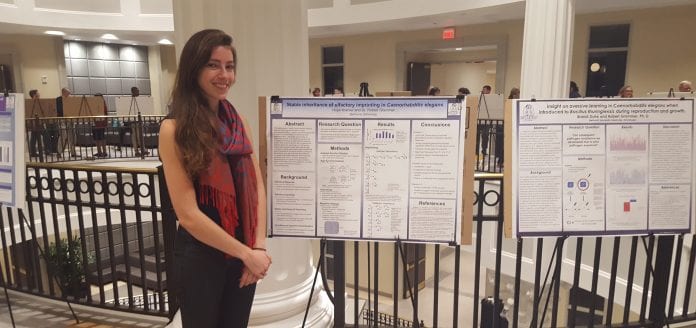Hope Kramer always knew she wanted to do medical research, and when she came to Belmont, she planned to pursue a Ph.D. after graduation. But after a few eye-opening experiences and long conversations with her mentor, Kramer began focusing her interests on the history of genetics. She was recently recognized in Study Breaks for her work.
As a science major in the Honors Program, Kramer is required to carry out an original research project and compose her senior Honors thesis. For these projects, Kramer decided to combine her love of history and science into one comprehensive exploration of the history and recent breakthroughs of genetic research.
Specifically, Kramer is interested in transgenerational epigenetics, a recent revolution in the field. She studied the worm C. elegan, a possible example of this phenomenon. Her idea to combine this project with her Honors thesis was inspired by the book The Gene by Siddhartha Mukherjee, assigned to her by her mentor. One section addresses the idea of transgenerational epigenetics through the historical case of the “Dutch Hunger Winter,” which exemplifies the idea that expressions of genetic adaptations as a result of environmental pressures can be passed down through generations, even when those pressures are removed. This idea is revolutionary to the study of genetics.
Kramer said, “I was blown away by both the controversial nature of this subject and the similarities it has to some previously debunked scientific ideas from centuries ago.” The book, and subsequently her thesis, maps the history of scientific thought.
The pursuit of complicated scientific ideas is not new to Kramer, who studied at the University of Glasgow and worked full-time there in a microbiology lab. She has also served as volunteer for Remote Area Medical, a non-profit airborne medical relief program in Knoxville, in addition to her year-long internship with Siloam Health Clinic last year. Through these experiences, Kramer said, “I realized how much I love the human interaction aspect of being a physician,” as well as the “intellectual act of diagnosis and understanding the amazing complexity of the human body.”
As a result of her experiences and research, Kramer has chosen to pursue an M.D. after she graduates in May. She intends to specialize in infectious diseases “and hopefully combine my love of research and underserved populations to help reduce health disparities in the world of caring for diseases.”



